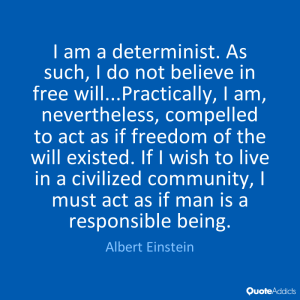Science Seen Physicist and Time One author Colin Gillespie helps you understand your world.
Physics Says There’s No Free Will Is Physics Right?
The concept of free will presents a problem. Physics is all about the rules of causation. Once there are rules there is no room for free will. This seems incontrovertible. But we will see that it is wrong.
 The argument for lack of free will persuades many physicists. Albert Einstein was a big fan of strict causation. So he believed free will is an illusion. He quoted with approval German philosopher Arthur Schopenhauer: ‘Man can do what he wants, but he cannot will what he wills.’
The argument for lack of free will persuades many physicists. Albert Einstein was a big fan of strict causation. So he believed free will is an illusion. He quoted with approval German philosopher Arthur Schopenhauer: ‘Man can do what he wants, but he cannot will what he wills.’
Some say quantum mechanics rescues free will for us. Popular physicist Michio Kaku neatly sums up this story. He calls it ‘a wild card’. Quantum uncertainty means our acts are not totally predictable. So its quantum random-number generator gives us free will? Not. Quantum physics is a mere distraction from the free-will conversation. If the laws of physics (random or otherwise) determine our actions then we don’t have free will.
The first part of why this argument is wrong is that free will is emergent. What does emergent mean? Its meaning here is this: a property is emergent when an ensemble of many elements has the property but neither single elements nor small numbers of them have that property. That is, emergence is how a new fundamental property arises from multiplicity.
The idea of emergence has a history. In 1738 Swiss physicist Daniel Bernoulli kick-started statistical mechanics. His calculations showed that impacts of a vast number of invisible molecules could explain how a gas exerted pressure. A single molecule of gas has no property of pressure. Nor do ten. But bring together anything like Avogadro’s number of them and this property emerges.
The story of our world hinges on emergence. Time One shows how space emerged from an even larger number of Planck-sized flecks in a gazillionth of a second. And it shows how between those flecks of space there must be twists. Sundance Bilson-Thompson’s topology shows how subatomic particles arise from twists. Cosmology is starting to show how galaxies with stars and planets emerged from a cosmos of atoms in a few hundred million years. Biochemistry is starting to show how life emerged from gazillions of atoms here on Earth in about a billion years. Evolutionary biology shows how our brain emerged from vast numbers of life forms over billions of years.
Free will is the product of conscious thought. And conscious thought is an emergent property of the educated human brain. A single synapse has no thought, no consciousness and no free will. But consciousness emerges from a hundred trillion of them organized for thinking. It is a whole new entity that had no prior existence.
Consciousness can contemplate the universe. Most importantly for free will, consciousness contemplates itself. Or, to put it another way, like the universe consciousness is a cause of itself. This makes it self-determining. Schopenhauer was wrong: we can will what we will. This property is not described by laws of physics.
Consciousness controls much of what we do. So what we do may mostly follow laws of physics but it is not completely controlled by them. This is the second part of why the laws-of-physics argument against free will is wrong.
The bottom line is this: Quantum mechanics’ rules of probability emerged from Planck-scale space and time (or motion). Physics’ rules of causation emerged from larger-scale space and time. But these rules don’t describe all that happens in the universe. Thanks to self-determination—which sits at the summit of all emergences—the rules of causation don’t describe free will.
Sources:
Albert Einstein (1932), “Mein Glaubensbekenntnis”, Einstein Archives Online, Nr 28-218, http://alberteinstein.info/vufind1/Digital/EAR000021080#page/1/mode/2up; “My Credo”, http://www.einstein-website.de/z_biography/credo.html
Image credit:
Quote Addicts; http://i.quoteaddicts.com/media/q2/1545817.png

No comments yet.